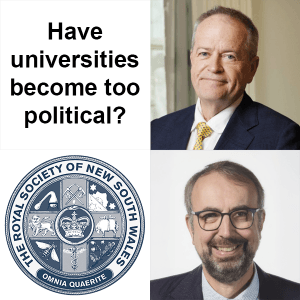

The audience of 60 people who attended the Society’s 1332nd Ordinary General Meeting at the State Library of NSW on 1 October 2025 enjoyed a captivating discussion on the theme of ‘Have universities become too political?’ between the new Vice-Chancellor or the University of Canberra and former senior Australian Government cabinet minister and leader of the Labor Party, the Hon. Bill Shorten, and senior academic leader, Professor Merlin Crossley AM FRSN, Deputy Vice-Chancellor (Academic Quality) at UNSW Sydney.
Their conversation centred on the challenges and future of Australian universities. Bill Shorten reflected on his transition from politics to academia, emphasising the importance of public service and the transformative power of education. They discussed the perception of universities in Australia, noting that despite having millions of graduates, universities are often criticised as being expensive, self-referential, and disconnected from broader society.
The key issues discussed included the financial pressures facing universities, such as student debt, research funding, and the reliance on international students. Bill Shorten highlighted the need for universities to collaborate rather than compete, suggesting that duplication of courses and infrastructure is wasteful. He advocated for specialisation among institutions and questioned the sustainability of having 40 comprehensive universities in Australia.
The discussion also touched on the political landscape, with references to government policies like the Job Ready Graduate program and fee-free TAFE, and the need for bipartisan support for higher education. Bill Shorten stressed the importance of universities in fostering critical thinking, innovation, and social cohesion, and called for a renewed narrative that celebrates their contributions. Personal anecdotes about family and the value of lifelong learning underscore his vision for universities as inclusive, adaptive institutions that support students and staff throughout their lives. Their conversation concluded with a call to rethink strategies, embrace collaboration, and better communicate the societal value of higher education.
A lively and well-informed audience Q&A followed, focusing on several key themes in Australian higher education. There was strong discussion about university governance, emphasising the need for University Councils to better reflect societal diversity and include staff and student voices. Overregulation and compliance burdens were highlighted, with calls for more principles-based approaches. Funding challenges were discussed, including the need for increased public investment and more business engagement in research. The session also addressed student and staff experiences, particularly the pressures of high fees, student well-being, and the importance of flexible learning options. Equity and access were recurring themes, with advocacy for more inclusive pathways and support for the arts and humanities. Finally, the importance of aligning university education with industry needs and improving graduate employability through work-integrated learning was emphasised. Overall, the session called for universities to be more inclusive, flexible, and responsive to both community and workforce needs.
A video recording of the presentation and Q&A session is now available on the Society’s YouTube channel, while a collection of images from the occasion is also available for viewing and downloading.